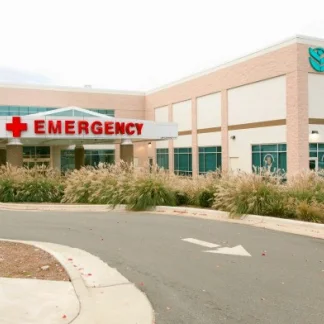Psychotherapeutic Services - Assertive Community Treatment Team
Psychotherapeutic Services - Assertive Community Treatment Team offers outpatien...
Alamance Regional Medical Center, located in Burlington, North Carolina, provides behavioral health care and mental health treatment to individuals struggling with a wide variety of life's challenges. If addiction is the primary diagnosis, clients are encouraged to seek treatment at a drug rehab center.
Alamance Regional Medical Center provides a clinical approach to addressing mental health concerns. Their levels of care include inpatient and outpatient treatment.
Inpatient Treatment The inpatient program is for individuals who need 24/7 supervision. Clinical therapy, coping skill classes, pet therapy, and holistic therapies are provided.
Outpatient Treatment The outpatient program provides individual therapy, group therapy, family therapy, couples counseling, case management services, integrated medical care, and psychiatric evaluations.
Private Insurance Alamance Regional Medical Center accepts most major medical insurance plans. Aetna, Anthem, Blue Cross/Blue Shield, Beacon, and Humana are a few of the plans accepted. Out of network benefits may vary, so it’s important to verify coverage with your insurance provider.
Contact us for more information: (336) 538-7888

Connect with Alamance Regional Medical Center by calling their admissions team directly.
(336) 538-7888 Website Get DirectionsECT is a form of treatment in which controlled electric currents are passed through the brain, sometimes causing short seizures. Treatments are done under general anesthesia. ECT appears to change brain chemistry for the better, and has been shown to provide fast and sometimes dramatic improvements in severe mental health conditions that can exist alongside addiction, including depression, bipolar disorder, psychosis, and suicidality. ECT is also often used by those who prefer it to taking medication.
Group therapy is any therapeutic work that happens in a group (not one-on-one). There are a number of different group therapy modalities, including support groups, experiential therapy, psycho-education, and more. Group therapy involves treatment as well as processing interaction between group members.
In individual therapy, a patient meets one-on-one with a trained psychologist or counselor. Therapy is a pivotal part of effective substance abuse treatment, as it often covers root causes of addiction, including challenges faced by the patient in their social, family, and work/school life.
Transcranial Magnetic Stimulation (TMS) is a non-invasive way of stimulating the brain in order to help with symptoms of depression. TMS uses elecromagnetic coils to deliver magnetic pulses to the brain, which can improve a patient's mood and ease depression. It's often used when other depression treatments haven't worked.
Group therapy is any therapeutic work that happens in a group (not one-on-one). There are a number of different group therapy modalities, including support groups, experiential therapy, psycho-education, and more. Group therapy involves treatment as well as processing interaction between group members.
In individual therapy, a patient meets one-on-one with a trained psychologist or counselor. Therapy is a pivotal part of effective substance abuse treatment, as it often covers root causes of addiction, including challenges faced by the patient in their social, family, and work/school life.
Transcranial Magnetic Stimulation (TMS) is a non-invasive way of stimulating the brain in order to help with symptoms of depression. TMS uses elecromagnetic coils to deliver magnetic pulses to the brain, which can improve a patient's mood and ease depression. It's often used when other depression treatments haven't worked.
In individual therapy, a patient meets one-on-one with a trained psychologist or counselor. Therapy is a pivotal part of effective substance abuse treatment, as it often covers root causes of addiction, including challenges faced by the patient in their social, family, and work/school life.
Transcranial Magnetic Stimulation (TMS) is a non-invasive way of stimulating the brain in order to help with symptoms of depression. TMS uses elecromagnetic coils to deliver magnetic pulses to the brain, which can improve a patient's mood and ease depression. It's often used when other depression treatments haven't worked.
Transcranial Magnetic Stimulation (TMS) is a non-invasive way of stimulating the brain in order to help with symptoms of depression. TMS uses elecromagnetic coils to deliver magnetic pulses to the brain, which can improve a patient's mood and ease depression. It's often used when other depression treatments haven't worked.
Psychotherapeutic Services - Assertive Community Treatment Team offers outpatien...
Life Changes provides confidential and professional services to meet the individ...
ADS Alcohol & Drug Services offers outpatient services for individuals with ...
God Did It Recovery Home – Women is a private rehab located in Burlington, North...